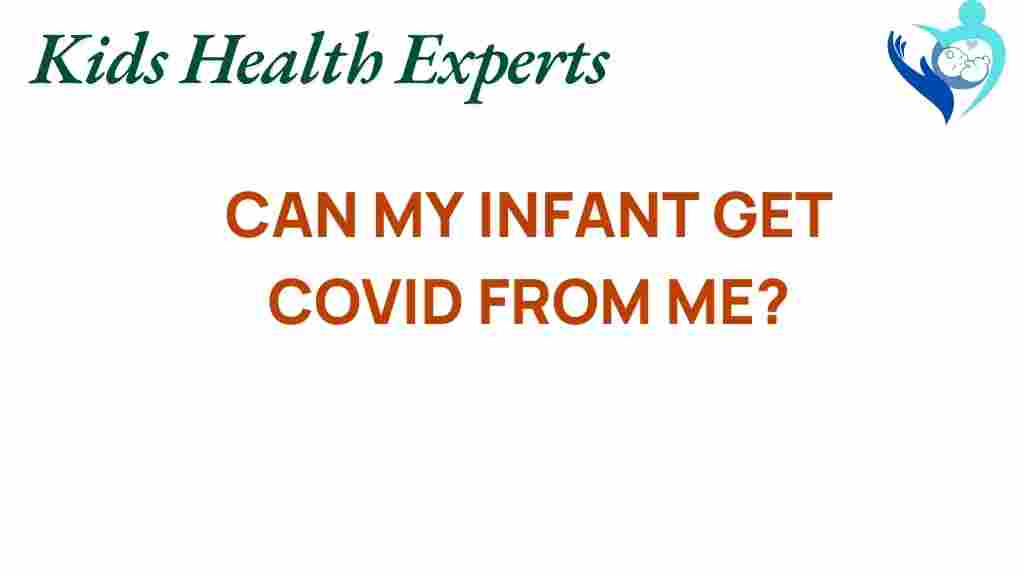Can My Infant Get COVID-19 from Me? Unpacking the Risks
The COVID-19 pandemic has brought forth numerous concerns for parents, especially regarding the health and safety of infants. As caregivers, understanding the transmission of COVID-19 and taking necessary precautions is essential to protect our little ones. Here, we will explore the risks of COVID-19 transmission to infants, the importance of safety measures, and how vaccination can play a crucial role in safeguarding your child’s health.
Understanding COVID-19 Transmission
COVID-19, caused by the SARS-CoV-2 virus, primarily spreads through respiratory droplets when an infected person coughs, sneezes, or talks. The virus can also survive on surfaces for varying periods, making it a significant concern for caregivers and parents. Here are some key points regarding transmission:
- Direct Contact: Infants can potentially contract COVID-19 through direct contact with an infected person, particularly caregivers or family members.
- Respiratory Droplets: When an adult breathes, speaks, or coughs, tiny droplets containing the virus can be inhaled by those nearby.
- Surface Contamination: The virus can also linger on surfaces, and infants, being curious, may touch these surfaces and subsequently touch their faces.
Infants and COVID-19: What the Research Shows
Research indicates that while infants can contract COVID-19, they tend to experience milder symptoms compared to older children and adults. The Centers for Disease Control and Prevention (CDC) notes that infants and young children have a lower incidence of severe illness from COVID-19. However, this does not mean they are immune.
Here are some important findings about infants and COVID-19:
- Infants can transmit the virus to others, although the rate of severe illness is lower.
- Most infants who contract COVID-19 exhibit mild to moderate symptoms.
- Infants with underlying health conditions may be at higher risk for severe illness.
Precautions for Parents and Caregivers
As a parent or caregiver, it’s crucial to adopt safety measures to protect your infant from COVID-19. Here are some essential precautions to consider:
- Vaccination: Ensure that all eligible family members are vaccinated against COVID-19. Vaccination significantly reduces the risk of transmission.
- Wear Masks: When in close contact with your infant, especially if you are feeling unwell or have been exposed to someone with COVID-19, wearing a mask can help prevent the spread.
- Practice Good Hygiene: Wash your hands frequently with soap and water for at least 20 seconds, especially after returning home, before feeding, and after changing diapers.
- Avoid Crowded Places: Limit exposure to crowded indoor spaces where the risk of transmission is higher.
- Maintain Distance: Keep a safe distance from anyone who shows symptoms of illness or has tested positive for COVID-19.
Creating a Safe Environment for Your Infant
In addition to personal precautions, creating a safe environment for your infant is vital. Here’s how you can ensure your home is a safe haven:
- Disinfect Frequently: Regularly clean and disinfect high-touch surfaces such as doorknobs, light switches, and toys.
- Limit Visitors: Be selective about visitors, especially those who may have been exposed to COVID-19.
- Establish a Routine: Keep a consistent routine for your infant, including feeding, sleeping, and playtime, to minimize stress.
What to Do If You or Your Infant Shows Symptoms
If you or your infant shows symptoms of COVID-19, it’s essential to act quickly. Here’s a step-by-step process to follow:
- Isolate Immediately: If you suspect you have COVID-19, isolate yourself from your infant and other family members.
- Monitor Symptoms: Keep track of any symptoms your infant may develop, such as fever, cough, or difficulty breathing.
- Contact Your Pediatrician: If your infant shows symptoms, contact your pediatrician for advice on the next steps.
- Get Tested: Arrange for testing for both you and your infant, if recommended by your healthcare provider.
- Follow Guidelines: Adhere to local health guidelines regarding isolation and treatment.
Vaccination and Its Importance for Caregivers
Vaccination is a critical tool in protecting not only adults but also infants from COVID-19. While infants themselves may not be eligible for the vaccine, ensuring that those around them are vaccinated helps to create a protective bubble. Here’s why vaccination is important:
- Reduces Transmission: Vaccinated individuals are less likely to contract and transmit the virus.
- Protects Vulnerable Populations: High vaccination rates in the community help protect those who cannot be vaccinated, such as young infants.
- Mild Symptoms: Vaccination can lead to milder symptoms if a breakthrough infection occurs.
Common Concerns and Troubleshooting
As a parent, you may have various concerns regarding COVID-19 and your infant. Here are some common issues and troubleshooting tips:
- Concern: “What if I test positive for COVID-19?”
Tip: Isolate from your infant and follow guidelines from your healthcare provider. Consider having a trusted individual care for your infant if possible. - Concern: “How can I comfort my infant if I’m unwell?”
Tip: Use video calls or voice messages to maintain a bond, and ensure your infant is well cared for by another trusted adult. - Concern: “Should I still breastfeed if I have COVID-19?”
Tip: The CDC recommends that breastfeeding can continue as long as proper hygiene measures are taken.
Conclusion: Prioritizing Safety and Health
As parents and caregivers, the health and safety of our infants must be our top priority. Understanding the risks of COVID-19 transmission and implementing safety measures can significantly reduce the likelihood of infection. Vaccination for caregivers and maintaining a safe environment are crucial steps in protecting our little ones. Always stay informed and consult healthcare professionals for guidance tailored to your family’s needs.
For more information on COVID-19 and health guidelines, visit the CDC website.
Remember, while the risks may seem daunting, proactive measures can keep your infant safe and healthy during these unprecedented times.
This article is in the category Care and created by KidsHealthExperts Team
